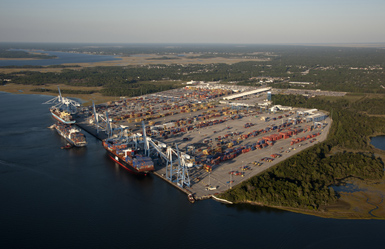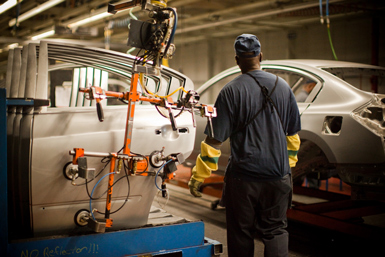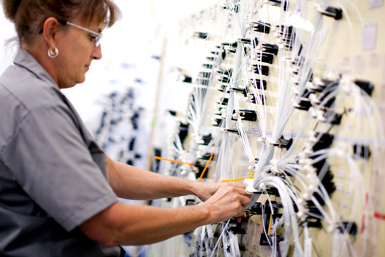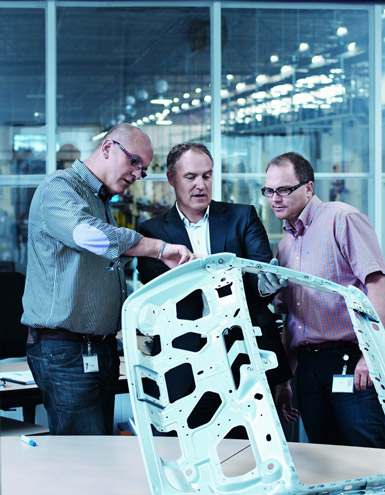Business-Friendly and Low-Cost
The commitment has paid off — companies have been coming to the South for decades, attracted by the friendly business climate and overall low business costs.
“Business costs in the South — especially land, energy, and labor — are among the most affordable in the U.S.,” says site consultant Mark Sweeney, senior principal for McCallum Sweeney Consulting in Greenville, South Carolina. “Transportation and energy infrastructure are generally strong. Favorable government policies also play a role in a company’s final site decision — southern states tend to have attractive tax structures, good incentives, and generally cooperative (rather than adversarial) regulatory agencies.”

The South also has a well-developed transportation infrastructure consisting of modern ports, railroads, airports, the Mississippi River, and interstates and highways, with connections to bustling, high-tech intermodal terminals. Many southern cities are only a one-day drive from about two thirds of the American population, making them ideal locations for manufacturers and distributors. The southern states continue to maintain and upgrade this vital infrastructure — South Carolina, for example, is investing $2 billion in its transportation system, including deepening harbors, adding port capacity, and building a new intermodal rail yard.
Some of the best-performing states are in the South, driven by manufacturing and energy. For example, Kentucky is shattering its export records, with a 14.2 percent increase in exports during the first 11 months of 2013 — the second-highest percentage increase among the 50 states for that time period (in comparison, overall U.S. export growth was only 2.3 percent). Last year was Louisiana’s best year for business development in the last six years, with projects totaling about 27,000 jobs and $26.4 billion in capital investment. Tennessee is another hot performer — its real GDP grew by 5.8 percent from 2010 to 2012, putting it in the top five states for that time period. The state also created 143,400 net new jobs from January 2011 to November 2013 (a growth rate of 5.46 percent).
Oil and gas recovered from “unconventional” shale deposits is boosting the energy sector. Large amounts of natural gas at affordable costs are stimulating industrial investments by oil refineries and petrochemical facilities. For example, two recently announced natural gas projects in Louisiana were among the largest investments in North America. Combined, Cheniere Energy’s liquefied natural gas export facility in Cameron Parish and Sasol’s integrated ethane cracker and gas-to-liquid project in Westlake could represent more than $20 billion in capital investment and nearly 2,000 jobs.
With all this economic activity, overall unemployment in the South is among the lowest in the nation. As the economy continues to recover, job growth in manufacturing in the southern states continues to outgain other manufacturing regions, like the Midwest and the Great Lakes. More companies are announcing new locations and expansions, including the construction of new corporate headquarters in big cities like Atlanta, Charlotte, and Nashville. Companies are also putting down roots in smaller communities — for example, Rain CII Carbon, a manufacturer of calcined petroleum coke, will relocate its headquarters from greater Houston to Covington, Louisiana, to be closer to its operations.

The South’s manufacturing base is as solid as the products it makes, including steel beams, cars and trucks, robots, aircraft, and rocket engines. As a result, job numbers are up. Georgia recorded a 10 percent increase in job creation during its most recent fiscal year — many of those jobs are in manufacturing. South Carolina recruited more than 15,000 new jobs in 2013. To meet increased manufacturing needs and provide customized training, Workforce Florida will provide $2 million in customized training grants dedicated to manufacturing.
Automotive
Manufacturing in the South, of course, is anchored by the revved-up automotive industry. In 2013 Alabama’s three auto assembly plants — Honda, Hyundai, and Mercedes-Benz — combined to break the previous year’s production record by 4 percent. This kind of success is attracting more supply-chain vendors to the area such as REHAU, a German company that is opening its first U.S. technical research center in the town of Cullman.
“Having a high-tech company like REHAU choose Alabama for a U.S.-based research and development facility means new products will be born here, which will lead to further growth of this industry in our state,” says Greg Canfield, Alabama’s Secretary of Commerce.
In Mississippi, Yokohama Tire Corporation will build a $300 million commercial truck tire plant in West Point. Kentucky’s auto industry is booming — its auto production is third-highest in the country, with vehicle and parts exports totaling $5.1 billion. Georgia’s Toyo Tire North America Manufacturing recently announced it would expand, creating 650 new jobs and investing $371 million over the next four years. “This is our fourth expansion and will help us meet the demand for our products by North American dealers and consumers,” says company president Jim Hawk.
Aviation and Aerospace
Aviation and aerospace R&D has deep roots in the South, led by the Kennedy Space Center in Florida and NASA’s Marshall Space Flight Center in Huntsville, Alabama. Boeing recently announced it would build a technology research center in Huntsville, creating up to 400 jobs. Other major players in Alabama are Lockheed Martin, Airbus, and Raytheon. In Florida, Embraer will manufacture its Legacy 450 and 500 aircraft at the Melbourne International Airport, creating 600 jobs.

GE Aviation recently announced it would build a $125 million, ceramic matrix composite (CMC) manufacturing plant in Asheville, North Carolina. These CMC components, designed to withstand extreme heat, will be used in the core of engines. “Asheville will be our first factory involved in the mass production of CMC components,” says David Joyce, president/CEO of GE Aviation. “This new facility will be on the ground floor of a new technology that will change aviation.”
Information and Communications Technology (ICT)
Some of the country’s most vibrant ICT clusters are in Raleigh Durham-Chapel Hill, North Carolina, and Atlanta, Georgia. For example, Allscripts, a leading developer of electronic health records, will expand its operations in North Carolina, investing $2.8 million and creating 350 new jobs. In Georgia, a new AT&T Foundry® facility will accelerate research and development. Located in Atlanta adjacent to Georgia Tech, the AT&T research team will develop home security and automation technologies.
Google established itself in South Carolina with the construction of a data center complex in Mount Holly. Plans are now under way for $600 million expansion, bringing Google’s total investment in South Carolina to $1.2 billion. Another ICT giant, IBM, will construct a $55 million, 800-job technology center in Baton Rouge, Louisiana. Since the announcement, computer science enrollment among freshmen at LSU’s College of Engineering jumped 60 percent.
Florida’s core ICT strengths include digital media, simulation and training, and health IT. iSirona, a company that specializes in medical device connectivity and integration, will undertake a $2.25 million expansion of its operations in Panama City, Florida, creating 300 new jobs. The company was ranked “One of America’s Most Promising Companies” in 2013 by Forbes magazine and the fifth-fastest-growing private company in U.S. healthcare in 2012 by Inc. magazine.
Next: Agribusiness, Life Sciences, Energy and FDI
{{RELATEDLINKS}}Agribusiness
Agribusiness is a driving force in the national and global economy, and for reducing hunger throughout the world. Food research and food processing are major employers in the South. For example, during the last decade, companies in Virginia’s food and beverage sector have invested over $1.8 billion and created more than 6,100 new jobs. The food processing industry accounts for 14 percent of total manufacturing employment in Virginia, making it the state’s second-largest manufacturing sector. Major companies include Hampton Farms, the leading roaster of in-shell peanuts in the country, which will invest $5.5 million to establish a peanut-butter production plant in Southampton County.

Syngenta Biotechnology will also expand its crop protection and seed development operations at RTP, investing $94 million and creating 150 new jobs by the end of 2018. “This is an extraordinary time of growth for agriculture in North Carolina and we are proud to be part of the region’s growing agricultural technology cluster,” states Michiel van Lookeren Campagne, president of Syngenta Biotechnology.
Life Sciences
Research Triangle Park is also home to scores of biotechnology and life sciences companies. The region’s universities are a steady source of highly qualified scientists and engineers, as well as established venture capital firms that invest millions in RTP-based companies every year. RTP tenants include ChemoGenics BioPharma, Dharma Laboratories, ENVIGEN Pharmaceuticals, GlaxoSmithKline, and Symmetry Biosciences, as well as many others at the North Carolina Biotechnology Center.
Georgia also has a strong life sciences sector. Anchored by the Centers for Disease Control and Prevention in Atlanta, the state’s life sciences industry consists of more than 400 life sciences companies and 225 health IT companies. R&D specialties include health informatics, hematology and immunology, and medical devices. Leading companies include Baxter, GE Healthcare, Philips Healthcare, and Greenway Medical Technologies.
Other states are hard at work developing life science sectors. Kentucky, for example, is developing Nucleus Innovation Park, a $2 billion project in downtown Louisville. The park will support startup companies in the biotech and life sciences fields. In northern Kentucky, the College of Informatics at Northern Kentucky University has launched UpTech, a business accelerator program that supports more than 50 early-stage informatics companies — the first of its kind in the nation.
Energy
The South does it all when it comes to energy — coal, oil and gas, nuclear, and alternative fuels. Louisiana has long been a leading U.S. oil and gas producer. The state is the second-highest crude oil producer (including offshore production) and third-highest natural gas producer in the nation. Louisiana also has a robust and diverse agricultural base that can produce feedstock for alternative fuels. For example, Green Circle Bio Energy plans to build a $115 million wood pellet manufacturing facility in the George County Industrial Park, which will produce wood pellets for European markets as a renewable alternative to coal.
West Virginia is experiencing a natural gas boom, thanks to the Marcellus Shale, a deep rock formation that is believed to contain more than 50 trillion cubic-feet of recoverable natural gas. Unlocking these vast reserves will likely stimulate both the chemical and manufacturing industries. West Virginia is also developing coal-biomass-to-liquids (CBTL) projects as a cleaner alternative to imported petroleum.

Foreign Direct Investment
“One of more powerful aspects of the South’s success over the last 50 years is the targeted effort at FDI, especially in manufacturing,” says consultant Mark Sweeney.
In the annual IBM-Plant Location International Global Location Trends report released in December 2013, South Carolina ranked first in the nation for per-capita employment by foreign-owned firms investing in the U.S. last year. Since January 2011, the state has recruited $6.7 billion in capital investment from foreign-owned companies, resulting in more than 15,600 jobs. For projects announced in South Carolina between 2011 and 2013, FDI represented 39 percent of new jobs and 61 percent of capital investment.
“South Carolina’s strategy for attracting foreign direct investment has been a successful one for the past several decades, netting companies like BMW, Michelin, Honda, and others,” says Secretary of Commerce Bobby Hitt. “While German companies have long been the top investors in our state, we’re seeing increased interest in South Carolina by Chinese, Japanese, and Indian companies.”
The long history of foreign direct investment in the South has been led by automobile manufacturing. Kentucky is developing very strong ties with firms such as Kayser Automotive, iwis Engine Systems, Dr. Schneider Automotive Systems, Mubea, Webasto Roof Systems, ZF Steering Systems, and others.
Tennessee is another FDI leader in the South, with a total investment of $27 billion by nearly 900 foreign-owned companies that employ 114,000 workers in their Tennessee operations. Japan, Germany, Canada, and the UK are the state’s leading contributors to FDI. New projects continue to be impressive — in October 2013, Korean-owned Hankook Tire announced plans for an $800 million factory in Clarksville.
FDI is responsible for more than 2,500 establishments in Florida accounting for 236,000 jobs. Big attractions for foreign companies include strong air and seaport infrastructure and a well-trained multicultural work force. Unipharma, a Venezuelan pharmaceutical company, recently announced it would establish its headquarters in Tamarac. The company cited Broward County’s easy access to foreign markets, growing life sciences cluster, and focus on contract manufacturing: “Our new facility will not only provide jobs for the local community, but also support Florida’s growing life science industry,” says Unipharma CEO Reinaldo Santa Marta.
Future Growth
By most indicators, the South’s economy will continue to be a solid performer in 2014. Companies that survived the Great Recession have become lean and have more cash to spend. Banks are making commercial loans again, the housing market has stabilized, and consumer confidence is fairly high.
“Manufacturing production rose 2.6 percent in 2013, slowing from the 3.5 percent and 3.2 percent growth rate experienced in 2011 and 2012, respectively,” indicates Chad Moutray, chief economist for the National Association of Manufacturers. “The lower 2013 figure stemmed largely from weaknesses in the first half of the year, with manufacturing output rising an annualized 4.2 percent in the second half. As such, the sector ended the year on a strong note, with a pickup in demand and cautious optimism for 2014. ”
According to Moutray, the strongest manufacturing sectors are motor vehicles and parts, electrical equipment and appliances, primary metals, food, beverage and tobacco products, apparel, petroleum and coal products, and chemicals — all key economic drivers in the South’s economy.
Foreign countries are also starting to emerge from the global recession. As a result, foreign companies are also feeling more secure about making investments in the United States, where states are showing they are highly competitive in going after capital investment. The southern states remain proactive in marketing themselves to companies across the world. Not only do they carry out periodic trade missions, but they also are committed to creating long-term relationships with key countries like Japan.
Alabama, for example, is an active member of the Southeastern U.S./Japan Association, which will hold its 2015 meeting in Birmingham. More than 65 Japanese firms have invested more than $4.4 billion in Alabama — and not just in big cities like Huntsville. In Jasper, Japanese firms HTNA (carpet, interior trim) and Nitto Denko Automotive (automotive supplier) will employ nearly 300 people combined once HTNA’s recently announced expansion is completed.
“These two Japanese companies have had a great impact on our economy, both directly and indirectly,” says David Knight, executive director of the Walker County Development Authority. “Anytime you have companies that employ hundreds of people and invest tens of millions of dollars, it can’t help but be a positive
